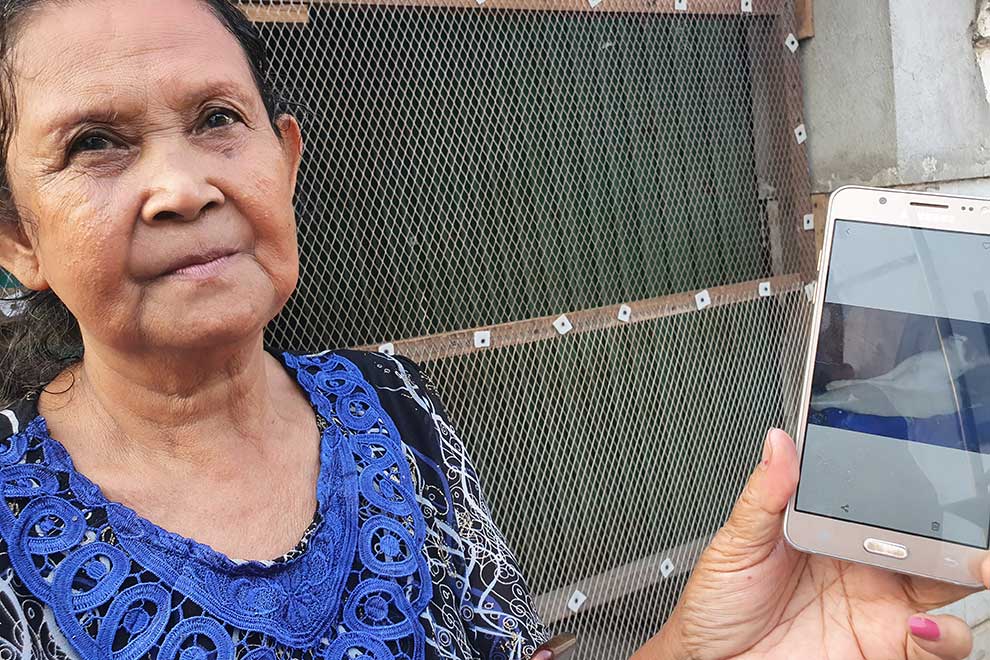
Auntie Sang shares her small one-story home with 15 cats but manages to keep things tidy and clean. Hong Raksmey
When Covid-19 took away her job as a gardener at a Phnom Penh hotel at the end of 2020, Om Sang or Auntie Sang found herself with too much time on her hands.
Despite her living in just a small $100-per-month house, she began caring for the stray cats in her neighbourhood, with the number of felines under her watch climbing to several dozen at times.
The 73-year-old’s favourite cats – who tend to stay with her full time – lounge about everywhere in the house, with some lying on pillows near the door or perched on her wardrobe, some tucked away under her shelves or the bed and others gathered near the dishes of food she has laid out for them.
Auntie Sang says her favourite cats – Milap, Aleak, JiJi, Ah Pich, Koun Med, Koun Meas, Reaksa, Mao Mao, Mean Mean, Chamroeun and Sambath – have all been with her for years, some of them for a decade or longer.
Auntie Sang had her nephew install a pet door in the front door of her rental home to make sure her cats that venture forth outside can find refuge when chased by dogs or if it starts to rain.
“Right now my only source of income is from my nephew and my grandson, who are construction workers,” Sang says.
Currently, Auntie Sang has 15 cats living under her roof where they have free run of the place and she also regularly feeds over 10 other stray cats that live nearby and according to her those numbers are relatively low compared to past years.
Even though Auntie Sang has been struggling financially due to unemployment, she feels that she can’t move from the rental house into a less costly dwelling or move in with family members because she’d almost certainly have to leave the cats behind.
Her nephew and grandson have had trouble at times covering her rent on the one-story Pochentong house – especially when they weren’t paid for their construction labour by a crooked contractor – but so far she’s managed to get by. “If I left behind these 15 cats maybe I would be able to live comfortably without having to worry about paying rent,” she tells The Post. “But where will they go? And what about the other stray cats around the hotel near here? Will they have something to eat? Even at 6pm or 7pm, they are always still out there waiting for the food we bring them. I can’t ignore them.”

Auntie Sang serves a mix of cat food and rice to 15 house cats and at least 10 stray cats at her one-story home. Hong Raksmey
Auntie Sang says she actually had a great fear of cats for more than half her life and that others used to laugh at her and scare her with cats for fun.
“Back in 2009, a white kitten came to me two days in a row and it jumped around in a way that reminded me of a horse. I was afraid so I turned away, but I said to it ‘son of a white horse, if you seek prosperity I will let you stay, but do not frighten me.’ The next day he came again and I found I wasn’t afraid and he stayed with me from then on.
“I started letting him sleep next to me and he began eating from a bowl I’d set out. Over the years, as he grew, everyone loved him – even the vet once asked to take a photo with him. At first I called him Lei because he was fat like a calf and then later I called him Koun Lei,” says Sang.
From 2016 to 2018, Koun Lei was hospitalised for a few days each year due to health problems and Auntie Sang says that she probably spent over $1,000 on medical care for the cat in that three year period.
“After the Cambodian vet said he couldn’t do anything further for him, I was distraught, so I took him to a French vet on St 111 to get a second opinion. He examined him and told me that it was true – Koun Lei had bladder problems that were incurable. He died in 2018 at the age of nine. I arranged for a funeral and held a Buddhist ceremony to send his soul to rest in peace,” Sang says.
Koun Lei was the first cat that Auntie Sang adopted and loved, but it would be far from the last. Next came Nang Nang, an orphaned kitten.
Around this time, because she already had Nang Nang, Auntie Sang gave away a cat that came to her named Ah Meas, something that she regretted then and still regrets today.
“I dreamed that Ah Meas was abandoned by the new owner to look for food in the trash,” she says. “I kept calling and asking her about Ah Meas until she confessed that her landlord said she wasn’t allowed to have pets, so she left Ah Meas on the street, homeless. It was too late,” says Sang.
Despite the fact that they are just cats, Auntie Sang considers them members of her family who deserve her care, consideration and attention.

Neighbourhood children sometimes stop by to pet Auntie Sang’s many kitties. Hong Raksmey
“They get to eat good food because I want them to live in happiness and do good deeds so that they can soon become human in one of their next lives,” she said. “When I come back from Buddhist ceremonies, I go to each cat and bless them all face-to-face.”
On the day she was visited by The Post, she was cooking fish soup and fried chicken for herself and her nephew as well as preparing food for the 25 cats inside and outside of her house she’s currently feeding .
Auntie Sang says that with about $45 worth of cat food – mixed with rice to save money and extend it further – all of the cats can eat for over one month.
“We can’t give them our food to eat because it can give them diarrhoea. Humans eat too much fat for them,” she says.
Auntie Sang says she has a few litter boxes filled with sand in the house and she cleans them twice a day by removing the cat’s waste, washing the sand outside and then drying it for reuse as she has enough sand to rotate it and keep the boxes filled.
“I don’t think there are any bad smells in my house because I bathe all of the cats,” she says. “Their food dishes are also washed each day.”
Auntie Sang says that cats have feelings just like humans do. She says that once one of her cats had a kitten that was torn apart by a dog and the mother cat sat and waited at the place it happened for a month before it gave up.
“Their painful memories don’t seem to last as long as ours do, so they will forget and behave normally again,” she says, tearing up while showing pictures of the cat on her phone.

Auntie Sang showing a picture on her phone of Koun Lie – her first pet cat and the one who cured her of her fear of them. Hong Raksmey
Auntie Sang was originally named Hang Dao Finn and then renamed So Rany, which was further shortened to So Ny during the reign of the Khmer Rouge.
“If I had continued to use the name my father had registered, I would have been taken away by Khmer Rouge militants and executed,” she says. “In the Sangkum Reastr Niyum-era, both my mother and father were high ranking officials in the civil service. I was married at the age of 15 and my husband was a pilot,” she explains.
Auntie Sang says she would never have been able to cover the expense of caring for all of her cats without the help she’s gotten from Kim Loan.
Loan is the founder of the Cambodian Association for the Protection of Animals (CAPA), based in Koh Nora village where she cares for nearly 200 dogs and almost 100 cats at her animal shelter.
“This would be an impossible situation without the help of [Loan] and CAPA and she will always have my gratitude and blessing,” she says.
With the uncertain income situation in the construction industry an ongoing problem for her nephew and grandson, she says she still has concerns about the food security situation for her furry friends, but she’s reluctant to even consider it.
If any animal lovers want to help Auntie Sang with the expense of caring for 25 cats, she can be contacted by phone: 016 74 54 53.














